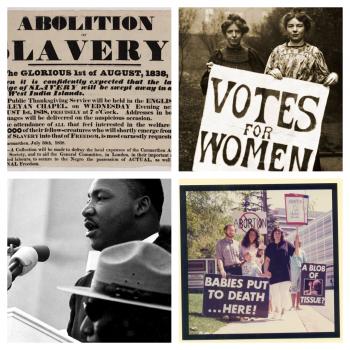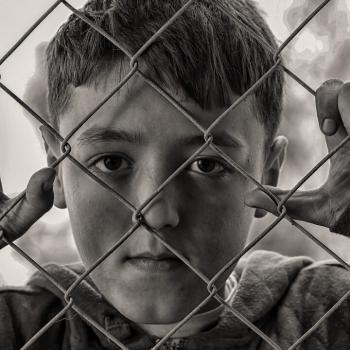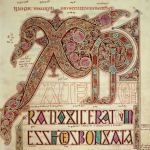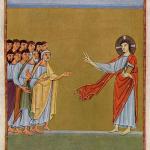
You will have heard, I take it, of a recent “wrongful birth” lawsuit. It was but one in a long string of them. The Daily Screech reported on it in August: After an amniocentesis, parents were told they had a healthy baby; parents delivered the baby. Turned out, baby has Syndrome Z. Turned out, the medical office had misread the results. So parents sued on the premise that they would have aborted the baby if only they had known about the Syndrome Z. This was not a unique case; half of all U.S. states recognize “wrongful birth” as a cause of action, and one couple was awarded a full $50 million in such a suit.
Yesterday Brandy Zadrozny, also for the Screech, reported on the inverse of all this: a case of “wrongful abortion.” (As though there could be a “rightful abortion.”) This time, a couple was informed that their baby had “abnormal genitalia” for a female child. (The report listed the gender as “XY.”) That meant the baby might develop “hormonal abnormalities and organ dysfunction.” Mother aborted the baby. One day later, doctor’s office called to say that “XY” was a clerical error; it should have been “XX.” Autopsy report showed no defects. Parents sued.
Screech reports:
The jury found the lab and its director had been negligent, but stopped short of attributing fault for the abortion itself, refusing to award damages for the Abbotts’ physical and emotional injuries. The verdict was upheld in an appeals court in February.
Yes. Sounds just enough, on its own terms. Ms. Zadrozny cites more case law, all of it with like results. But she also cites this paper in the Yale Journal of Health Policy, Law, and Ethics, in which the authors—-Ronen Perry and Yehuda Adar—conclude that these decisions are a “disturbing anomaly” for which the law has found no real solution. The reason is because “wrongful birth” lawsuits go in the parents’ favor, “wrongful abortion” lawsuits do not.
So what we have here is legal precedent by which it is wrong if a child is born in error, but not wrong if a child is killed in error. Better, it seems, that the healthy should die than that the sick should live. It’s the price we pay for casting the abomination out from the land.
The most disturbing precedent in all this is the case of Martinez vs. Long Island Jewish Hillside Medical Center (1987).
A deeply religious woman, Carmen Martinez, agreed to an abortion after being told that a medication she had taken would cause major birth defects. [That] turned out to be untrue. The court ruled in her favor, not for the pain that came from losing a wanted child, but as a result of the anguish that came from violating her religious beliefs. The appeals court further explained the unnecessary role of the actual baby in the judgment. [Think about this, now.] “The emotional distress for which she seeks recovery does not derive from what happened to the fetus; it derives from the psychological injury directly caused by her agreeing to an act which, as the jury found, was contrary to her firmly held beliefs.”
In other words, what the court is saying here is that the baby does not have any intrinsic worth apart from what we think of it. Whether wrongful birth or wrongful abortion, the key thing is that the doctors get the data right. Only then can the parent make the right decision about the worth of their child’s life. If the details are wrong, the parents may judge wrongly. Hospitals and labs and doctors may be liable for damages. That’s our modern ethic.
***
What concerns me in all of this is that it is the result of having first accepted a false ethic. The false ethic says that it is all well to take an unborn life—for any reason; for whim. In this case, you may take it if it is under the burden of some “defect.”
The only reason the law can come up with phrases like “wrongful birth” or “wrongful abortion,” and then labor to assign liability and just recompense, is because it has first accepted that it is okay to kill innocent life for any reason. If a parent thinks, based on some personal system of weights and measures, that a child with Down syndrome has no business living, well, just make sure you know it has Downs.
The law can labor over these questions because it has rejected the idea that all life is sacred, that all babies have a right to be born, that their merit is intrinsic to their personhood and not relative to their abilities, and that parents have a moral duty to care for their children. See what Roe hath wrought.
The questions raised by “wrongful births” and “wrongful abortions” are not the right questions because they derive from the wrong answer to an earlier question. And if pro-lifers are to address these issues at all, they need to insist that we return to the earlier question and answer it right. Right now, the law is attempting to answer the wrong questions. It is quibbling over the details that arise from false premises. No good will come of that. It needs to correct the premise.
But there is another point to make about all this, which has to do with the human need for some system of ethics. People cannot simply abandon all ethics. God writes the law on our hearts, and if we reject it, we must search for another to fill the void. When the law is rejected that tells us that all human life, whatever its burdens, is equally worthy and equally sacred, what follows is a law that assigns liability for giving false data by which one may appraise the relative worth of a life.
That is the brave new world into which we have arrived. It comes from our rejection of God, and the law of God. It comes from replacing Him with ourselves, and His immutable Law with our own plastic legal codes. And we will never get the answers right, or even be able to ask the right questions, until we return to the reality and authority of God as a first principle.
***
If you like the content on this blog, your generous gift to the author helps to keep it active. I remember all my supporters in my Mass intentions each week.
















